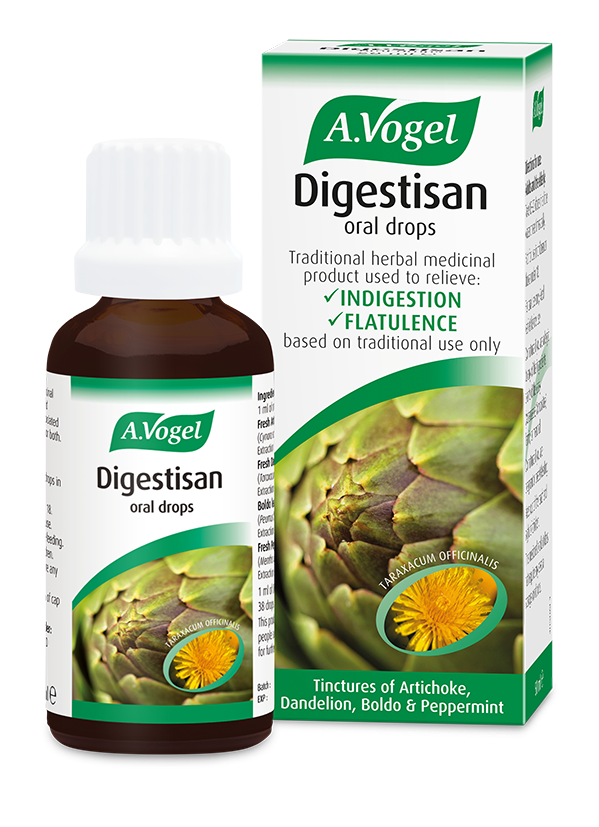What does trapped wind feel like?
Although the most obvious indications of trapped wind are flatulence and burping, there are several trapped wind symptoms including:
- Stomach cramps
- Bloating
- Nausea
- Vomiting
- Rumbling or gurgling sounds
- Abdominal pain
- The uncomfortable feeling of needing to pass gas.
What causes trapped wind?
Trapped wind is caused by a build-up of pressure in your digestive system. We naturally swallow air as we eat, drink, or swallow saliva, so this can add to gas building. Intestinal gas can also build up when food is digested throughout the stomach, small intestine and large intestine, which, if in excess, could add to your trapped wind symptoms. Normally we pass this gas produced through flatulence or belching which can sometimes lessen the 'feeling bloated' symptom.
We pass wind approximately 10 times a day, but most flatulence gases are odourless and released in small quantities so you may not even notice! Bad-smelling wind isn't necessarily something to worry about, it just means there are certain gases present such as sulphur.
Trapped wind occurs when gas doesn't move as easily as it should through the digestive tract. Certain habits such as chewing gum, or consuming too many artificial sweeteners could also add to this problem.
Slow-moving gas increases the pressure in your abdomen and causes the symptoms of bloating and pain. This can also be why trapped wind and bloating are closely connected.
Physical remedies to relieve trapped wind
1 - Exercise regularly
Physical activity that gently squeezes and then releases the GI (gastrointestinal) tract is a great way to massage the internal organs and support gas release.
Simply relaxing, lying flat and practising some deep breathing can be a nice way to start, before allowing yourself to slowly bring yourself around to start with some movement.
Physical activity options such as stretching, certain yoga poses, mindful breathing techniques such as child's pose, happy baby pose or knees to chest pose (also known as wind relieving pose), which were designed to help relieve trapped gas or digestive discomfort.
For child's pose, kneel with your knees wide and toes touching. Lower your body down onto the floor between your legs and place the forehead on the ground or a blanket. Extend the arms out in front of your body palms facing downwards. Take several deep breaths here and relax into the pose. Repeat as necessary and reap the benefits.
Relaxation is an added benefit of purposely moving gently. This can generally aid the digestive system work, perhaps encouraging a bowel movement when required too, such as in cases of chronic constipation.

2 - Wear loose clothing
Wear looser clothing around the waist to allow room for your food and gas to pass through the digestive tract. A tight waistband can easily become too constrictive and add to trapped wind pain.
3 - Sit up straight
Eating food whilst sitting and with a straight spine will help to prevent indigestion caused by hunching over and restricting the GI tract. This can help to prevent gas since it supports how the digestive system works. Eat with your mouth closed to prevent taking in too much air.
4 - Apply heat
Gentle applying a hot water bottle can be a nice tactic and one of many home remedies to relieve tummy pain of any kind, including helping to manage trapped wind. The heat will help to minimise the intensity of the pain felt and buy you more time for the gas to move on.
5 - Consider how you eat
Eat food slowly, chew well and opt for more frequent meals, rather than only eating one massive meal per day. As well as sitting up straight, these habits will all help your digestive system to work more efficiently.
Relaxing is an important part of mindful eating too. If we are stressed we may be more likely to consume excess air, whether or not we are eating at the time!
What should I eat if I have trapped wind?
6 - Pumpkin
Trapped gas processes can risk contributing to the improper absorption of nutrients, which is ironic as many fibre-rich foods such as pumpkin are pretty nutrient-dense!
Pumpkin is one of the few foods that is naturally high in fibre, but low in FODMAPs, which are a class of fibrous elements that can be tricky in certain groups of people, such as those with irritable bowel syndrome (IBS).
Generally, fibre is helpful to keep your digestive system regular and relieve gas, but, as above, it can be tricky for certain individuals.
If you worry your gastrointestinal symptoms, including symptoms of trapped wind, are excessive, or are the result of a bowel condition such as irritable bowel syndrome or coeliac disease, you should seek medical help so your doctor can make any formal diagnoses.
7 - Eat fermented foods
Especially if you experience upper gastrointestinal symptoms, such as the feeling of gas or bloating further up in your abdomen, supporting your stomach with bitter herbs can be a good place to start.
These can help to naturally reset the internal environment of the gut, so sources of good bacteria are then likely to be better received. Please note, if you are in any doubt, the presence of upper gastrointestinal conditions should always be investigated.
Then, adding in fermented foods like yoghurts that are rich in probiotics can be helpful to manage bloating, relieve gas and could also target a whole host of other gastrointestinal symptoms.
Probiotics often contain Bifidobacterium and Lactobacillus; two bacteria that are beneficial in gas reduction, as well as with IBS symptoms like bloating, constipation, and diarrhoea.
For those with food intolerance such as lactose intolerance or gluten intolerance, you might find the fermented forms of these foods are generally much better received, since they are gentler on your system and bacteria have already started to break the tougher structures of these foods down.
8 - Avoid fruit juices
Fruit juice contains fructose, a sugar that passes into the colon undigested. Once the bacteria break down the sugar it is likely to cause bloating and gas, especially when these are consumed in larger amounts.
Drink no more than 150ml of fruit juice at a time or drink it with some food so that the sugar can be digested more easily.
Generally, I say to stick to water, if you need to mix it up to make it more palatable - sip on warm water instead or add some herbs or fruit slices.
9 - Foods to avoid
Avoiding foods such as sugar, caffeine and alcohol could help since they risk disrupting the bacteria in the digestive system, which could lead to an increase in trapped gas. People who chew gum often may also be putting themself at risk.
Then, what about certain foods that are generally considered to be healthy, but get a bad name for contributing to trapped gas, such as cruciferous vegetables including broccoli, sprouts and cabbage, plus beans onions or garlic? This is where the advice on following a low FODMAP diet comes from.
My advice would be to not embark on this diet style without consulting with a qualified nutritionist or healthcare professional first.
Then, avoid carbonated drinks which already contain high levels of carbon dioxide, plus a whole host of artificial sweeteners, which arguably can do more damage to your gut flora than standard sugar!
Check out our blog exploring which healthy foods that could be causing your bloating, where we offer up some food swap ideas! Keeping a food diary can also be a useful tactic if you're not exactly sure what might be contributing to your excess gas.
10 - Herbal tea
Home remedies anyone? Peppermint, ginger and chamomile are great herbal tea options for relieving trapped gas (and they may also have additional health benefits) and probably the easiest way to ingest them is through tea form.
Also, these are a great option for those with lactose intolerance since they don't require the addition of any milk, and interestingly, of all the routes mentioned, these would often be the go-to in many cultures, such as in the traditional Persian medicine perspective.
Peppermint oil contains menthol and boasts antispasmodic properties; it is calming and can soothe the digestive tract, as well as ease stomachs that are affected by nerves or stress.
Ginger also has antispasmodic properties which can help alleviate stomach cramps or the ill effects of swallowed air.
Chamomile is not only antispasmodic, but it is also anti-inflammatory with relaxing properties. It can help with heartburn and gas caused by indigestion – does anyone fancy a cuppa?
I always say too, that the more beneficial drinks you have, even if it's simply sipping warm water, will minimise the impact of less helpful options, such as fizzy drinks.
Then, not a herbal tea, as such, but activated charcoal is another ingredient worth considering to help relieve intestinal gas that you could pick up at your local health stores. Activated charcoal normally comes in capsule form (it can be found in toothpaste too), and it can help to mop up noxious substances as it passes through the bowel.
Natural remedies for trapped wind
11 - Digestisan
Digestisan is a herbal indigestion remedy combining the herbal ingredients dandelion, artichoke, boldo and peppermint and can help to target the symptoms of indigestion or flatulence.
12 - Silicol Gel
Silicol Gel can be used to help relieve the symptoms of irritable bowel syndrome, acid reflux, or the symptoms of trapped gas including abdominal discomfort or nausea.
It helps to create a protective layer in the intestine where it can work to adsorb harmful substances, therefore aiding in the relief of trapped wind, gas, nausea, and stomach ache.
13 - Molkosan
Molkosan is rich L+ lactic acid and can be a welcome addition to a regime hoping to release trapped wind or gas.
Maintaining a healthy internal environment through other prebiotics such as apple cider vinegar can help to prevent the build-up of gas in the first place, and also encourage the correct processing of them.
Let it go!
Holding in gas can often do more damage than good, as it can lead to heartburn, indigestion, pain, or more gas buildup!
Having some trapped gas now and again is completely normal, and while herbal and home remedies are good for helping ease and relieve symptoms, sometimes it's better to let it go!
Blog originally published on 26/7/2017, updated on 23/02/2024








